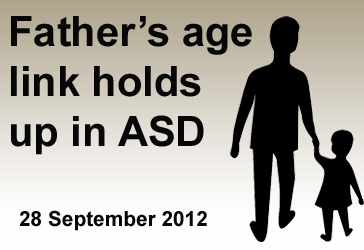Check out other stories from the Latest News
Paternal Age and Autism Link Holds Up in Aruba
By Chelsea Toledo, M.A. on September 28, 2012

Background: Several major studies have demonstrated that children with Autism Spectrum Disorder (ASD) are more likely to be born to older fathers. However, the majority of that research has been carried out in high-income countries such as the United States, Western Australia and the United Kingdom. Research in less industrialized settings could shed light on the level to which social and cultural factors contribute to the prevalence of ASD within a geographical area.
What’s New: In the September 2012 version of PLOS ONE, researchers report that Aruban children with ASD are more than twice as likely to have been born to a father over age 30 than their peers without the disorder. Studying publically available medical records, they determined that the risk of having a child with ASD was about twice as high for fathers in their thirties and two and a half time as high for fathers in their forties than the risk for younger fathers. These findings are consistent with those from more industrialized nations and demonstrate that the link between paternal age and risk for ASD is present in a country with lower income, where the economy and demographics are in transition.
Why it’s important: While it is understood that the risk of having an autistic child increases with the age of the father, the explanation for that association is not yet clear. Because fathers in Aruba have diverse reasons for delayed parenting, the study effectively rules out the theory that men with unperceivable autism tend to have children later and pass on those genes.
Help me understand :
| Source(s) : |
| Tweet |

